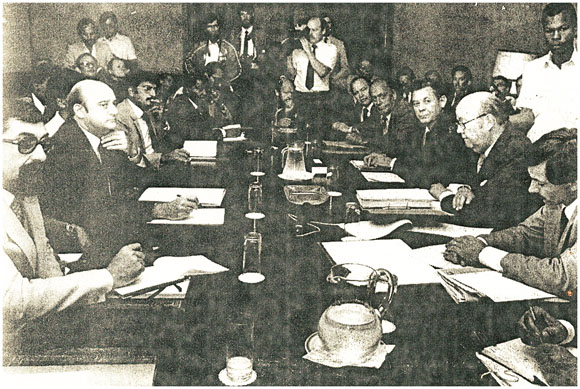Mozambique's InternationalRelations with South Africa
Dossiers MZ-0374 and MZ-0007, part 5
![]()
![]()
5. Negotiations Lead to Nkomati,
December 1983-March 1984

Above: Mozambican and South African delegations at the negotiating table, January 1984. The Mozambican side is led by Jacinto Veloso (second from left, adjusting his tie), while the South African team is led by the Director-General in the Ministry of Foreign Affairs, Han van Dalsen (second from right).
In December 1983, as tensions mounted, the Portuguese government began to push for a summit meeting between the government of Mozambique and the apartheid regime. Pik Botha and Joaquim Chissano had already met once, and early In December Botha travelled to Lisbon to discuss such a possible meeting. On 20 December, Jacinto Veloso and Botha met in Swaziland, and President Machel, commenting on the meeting, remarked that you can’t choose your neighbours – “they are uncomfortable with us and we are uncomfortable with them (eles são incómodos para nós, nós somos incómodos para eles). In fact, it was reported that
the South Africans, used to buying the reluctant cooperation of black neighbours, found themselves confronted with a long list of acts of aggression and destabilisation, a demand to end their undeclared war against Mozambique, and ... a security agreement as a pre-condition of any economic arrangements. They turned abusive and stormed out, and it was only when tempers had cooled that negotiations got under way (Africa no.182, April 1984, p.23).
A series of high-level meetings about security issues followed, officially with the objective of avoiding aggression and acts of violence. The South African objective was to render the ANC presence in southern Mozambique toothless, while the Mozambicans wanted to end South Africa’s more-or-less undeclared support for the MNR/RENAMO, consistently referred to as merely “armed bandits”. These discussions took place in
… Maputo and Pretoria on 16 January, [with] further talks in Maputo on 20 February and Cape Town on 2 March, and tripartite talks involving Portugal, on the Cabora Bassa dam and South African purchases of its electricity, in Lisbon in mid-February and Cape Town a few weeks later (Africa no.182, April 1984, p.23).
By 3 March 1984, it was announced at a meeting in Cape Town that the text of an agreement (the “Nkomati Accord”) had been agreed by both sides, and would be signed “in the near future”. The Mozambican government hailed this as a “victory for its socialist policy of peace”. In Addis Ababa the ANC’s Johnny Makatini commented with some restraint that the liberation movement “completely understood” the desire of the Mozambican government to reduce regional tensions, while the Tanzanians and other members of the Frontline States expressed their total “solidarity” with the initiative.
The date for the formal signing of the accord was set for 16 March.
MHN Resources
Consolidated Downloadable Zipped Files
Click on the yellow folder image below to download a zipped file of the fifth of a series of dossiers on South Africa-Mozambique relations. The archive covers the period December 1983 to March 1984, and contains 102 documents. New items will be added from time to time: this edition of the dossier is dated 23 October 2021.
![]()



![Aluka: Struggles for Freedom [subscription required] Struggles for Freedom](imgs/aluka_200.png)


